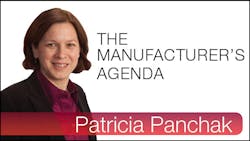The Best Business Books about Enlighted Workforce Leadership
Boy did I take on a challenge that was bigger than I can handle--at least with the deadline I gave myself.
Maybe you can help.
You see, when I was writing my December column, I got the great idea to compile a list of the best business books about effective workforce leadership strategies and tactics. As I was writing, so many classics that I'd read jumped to mind--but I didn't have enough space to fit them in the column.
So I told myself--and included a little note in the print edition so I couldn't back down--that I'd include this amazing list when I posted the column online.
That day is today, and my list is long; it's woefully incomplete; and I have more questions about which of the books are the best than I have answers.
In this post, I'll start with the ones that popped to mind. Old faithfuls that weigh down my bookshelf because I just can't part with them. I know I've left a few out, perhaps even ones that I'll slap my forehead in disbelief, and perhaps books written by people I greatly respect and admire--and don't want to offend.
Then you can take me to task, challenge my selections, make a case for yours--and await my next installment.
Ultimately, we'll all benefit.
So here's my start:
Maslow on Management, Abraham H. Maslow, with Deborah C. Stephens and Gary Heil. Forward by Warren Bennis. John Wiley & Sons, Inc., 1998.
I begin with a book written by a pioneer in adapting humanistic psychology to the workplace, Abraham H. Maslow, whose books were published in the early 60s. This particular volume is my favorite because it features interviews of executives who credit their--and their company's--success to their empowering approach to leading people.
What Matters Now, Gary Hamel. Jossey-Bass, A Wiley Imprint, 2012.
I go next to one of the most recent I've read that pushes Maslow's thinking deeper into workplace, and that builds on his own earlier work, The Future of Management. In that book, Hamel extended Maslow's hierachy of needs toward a hierachy of human capabilities at work. In What Matters Now, he calls for an upending of the command-and-control business organizational structure in favor of a structure that unleashes the "human potential of the people." Most important, he describes the practices of successful companies that currently operate without a traditional corporate hierarchy, including W.L. Gore & Associates, Morning Star, and HCL Technologies.
The work of Maslow and Hamel, to me, present fitting book-ends to a half-century of research, reports and books that support the benefits of and recommended practices for leading people with respect. Between them are many others, including the following:
In Search of Excellence, Thomas J. Peters and Robert H. Waterman, Jr. Harper and Row Publishers, Inc., 1982.
Who can forget the energetic management book that features at least three chapters and many anecdotes demonstrating how successful companies free employees to act in the best interest of serving the customer.
Leadership is an Art, Max DePree, Dell Publishing, 1989.
A much, can I say, quieter book than the previous, DePree, then CEO of Herman Miller, Inc., muses in a chapter called "Participative Premises" about the need for respect for people as a way to develop healthy relationships and building trust so as to leverage the strength that each employee brings to the business.
The Machine that Changed the World, James P. Womack, Daniel T. Jones, and Daniel Roos, Harper Perennial, 1990.
I can't possibly leave off the list the book that's credited with introducing Lean Production. Though the book didn't dwell on Respect for People, which later became known as a critical "pillar" of the Toyota Production System, it introduces how the company came to value and continuously invest in the enhancement of the workers' skills, as well as "to gain the benefit of their knowledge and experience as well as their brawn."
Good to Great, Jim Collins. Harper Collins, 2001.
When a book coins a phrase as memorable and forcefully targeted to company CEOs, it's difficult to forget. This book wins the prize by pointing out that successful business leaders do not follow the "genious with a thousand helpers model."
Well that's my start, heavily weighted, I admit to the older books--and still leaving out classics by Phil Crosby, W. Edward Deming, and Joseph Juran, and other pioneers of the Quality era, as well as many other suggestions that I received in response to an IndustryWeek Manufacturing Network discussion.
Please stay tuned and help me flesh out this list and as I add more of the more recently published.
About the Author
Patricia Panchak Blog
Editor-in-Chief
Focus: Competitiveness & Public Policy
Email: [email protected]
Follow on Twitter: @PPanchakIW
Call 216-931-9252
In her commentary and reporting for IndustryWeek, Editor-in-Chief Patricia Panchak covers world-class manufacturing industry strategies, best practices and public policy issues that affect manufacturers’ competitiveness. She delivers news and analysis—and reports the trends--in tax, trade and labor policy; federal, state and local government agencies and programs; and judicial, executive and legislative actions. As well, she shares case studies about how manufacturing executives can capitalize on the latest best practices to cut costs, boost productivity and increase profits.
As editor, she directs the strategic development of all IW editorial products, including the magazine, IndustryWeek.com, research and information products, and executive conferences.
An award-winning editor, Panchak received the 2004 Jesse H. Neal Business Journalism Award for Signed Commentary and helped her staff earn the 2004 Neal Award for Subject-Related Series. She also has earned the American Business Media’s Midwest Award for Editorial Courage and Integrity.
Patricia holds bachelor’s degrees in Journalism and English from Bowling Green State University and a master’s degree in Journalism from Ohio University’s E.W. Scripps School of Journalism. She lives in Cleveland Hts., Ohio, with her family.
